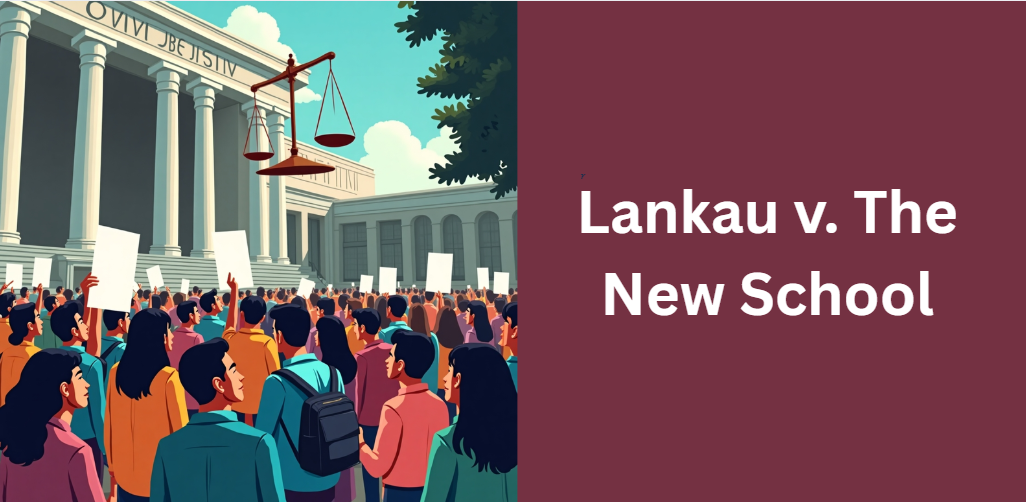Lankau v. The New School: A Comprehensive Look at the Lawsuit Shaping Education Policies
In recent years, the education sector faced unprecedented challenges, particularly during the COVID-19 pandemic. One notable legal battle that emerged from this disruption is Lankau v. The New School, a class action lawsuit filed by students against The New School university. The case highlights concerns about the quality of education students received after campuses shifted to remote learning while still charging full tuition fees.
This article delves deeply into the details of Lankau v. The New School, examining the background, legal claims, proceedings, and its broader implications for higher education.
Background of The New School
The New School, established in 1919 in New York City, is a well-known private research university recognized for its progressive approach to education and strong programs in social sciences, design, and liberal arts. The university attracts a diverse student body, including international students, artists, and scholars seeking a vibrant academic environment.
Before the pandemic, The New School was known for its hands-on, in-person learning experiences. These programs were a key reason students were willing to pay premium tuition fees. However, like many institutions, The New School had to pivot abruptly to online education due to COVID-19 restrictions, significantly changing the student experience.
Circumstances Leading to the Lawsuit
When the COVID-19 pandemic hit in early 2020, colleges and universities worldwide closed their physical campuses to prevent the virus’s spread. The New School transitioned to remote learning almost overnight, offering classes through virtual platforms rather than face-to-face interaction. While this shift was necessary for public health, many students felt the quality and value of education diminished substantially.
Despite this major change, The New School continued to charge full tuition and fees, the same amount as before the pandemic. For students who had enrolled expecting in-person instruction, access to campus facilities, and direct faculty engagement, the remote experience often felt inadequate.
This growing dissatisfaction sparked the lawsuit known as Lankau v. The New School, wherein students argued that the university breached its contractual obligations by not delivering the education as promised.
The Plaintiffs: Who Are They?
The plaintiffs in Lankau v. The New School are primarily students who paid full tuition expecting traditional in-person education. The lead plaintiff, Lankau, represents a larger group of students who collectively claim that the university failed to provide the value agreed upon in enrollment contracts.
These students come from various academic programs but share similar grievances about reduced access to campus resources, limited interaction with professors, and a perceived drop in educational quality. Many felt that the remote learning environment could not justify the steep tuition fees charged during the pandemic.
Legal Claims and Allegations
At the heart of Lankau v. The New School are several legal claims brought by the students against the university:
- Breach of Contract: Students contend that enrollment contracts implied access to in-person instruction and campus resources, which were not delivered after the switch to online classes.
- Unjust Enrichment: The plaintiffs allege that The New School unjustly retained tuition fees despite providing a service of diminished value.
- Failure to Provide Promised Services: The lawsuit argues that the quality of remote education was significantly inferior to what was advertised and paid for.
These claims collectively form the basis of the lawsuit, seeking financial compensation and changes to institutional policies.
The Legal Journey
The filing of the lawsuit marked the beginning of a complex legal process. Court proceedings involved motions by both sides, with the university defending its actions as necessary during an emergency and the plaintiffs pushing for recognition of their rights as consumers of educational services.
Legal representatives for the students worked to certify the case as a class action, allowing all affected students to join and benefit from any potential settlement. This collective approach aimed to strengthen the students’ negotiating power against the university’s legal team.
Settlement and Class Action Process
As the case progressed, a settlement agreement was proposed. The settlement offers affected students partial tuition refunds or other compensation for the disrupted educational experience. However, participation in the settlement requires students to submit election forms by a specified deadline, which was September 27, 2024.
Table: Key Settlement Dates and Actions
| Date | Action Required |
|---|---|
| Settlement Announcement | Students notified of the proposed settlement |
| September 27, 2024 | Deadline to submit election forms |
| Post-Deadline | Distribution of settlement payments |
This settlement phase allows students to decide whether they want to participate and receive compensation or opt out and pursue other legal options independently.
Implications for Higher Education
Lankau v. The New School is more than just a lawsuit; it represents a shift in how student rights and institutional responsibilities are viewed during crises. The case sets important precedents for how universities might need to handle tuition fees and service delivery during unexpected disruptions.
Institutions across the country are watching closely, as similar lawsuits have emerged elsewhere. This legal battle encourages universities to be more transparent about their obligations and flexible in tuition policies when educational services are altered drastically.
Expert Analysis and Commentary
Legal experts suggest that Lankau v. The New School could influence future contractual agreements between students and educational institutions. They highlight that students are increasingly seen as consumers entitled to certain guarantees regarding the education they pay for.
Comparisons with other class action lawsuits against universities reveal a trend of demanding accountability and fair treatment in unprecedented situations like a global pandemic. Experts anticipate that universities may adopt clearer refund policies and more robust online learning infrastructures as a result.
Conclusion
In conclusion, Lankau v. The New School is a landmark case illustrating the challenges faced by educational institutions and students during the COVID-19 pandemic. It underscores the importance of upholding contractual commitments and fair tuition practices, especially when traditional educational models are disrupted. The case’s outcome will likely resonate across the higher education sector, prompting universities to rethink how they balance financial policies with student expectations in uncertain times
If you want to stay informed about the latest updates on Lankau v. The New School and related developments in education law, keep an eye on legal news and university announcements.
More Posts
Exploring Melekaike Laka: Meaning, Cultural Roots, and Spiritual Significance
ExtremeChat Review 2025: Is Exteremchat Legit or a Scam? Detailed Insights and User Guide
Unlocking the Power of Number Avstarnews: A Deep Dive into the Future of Digital News






